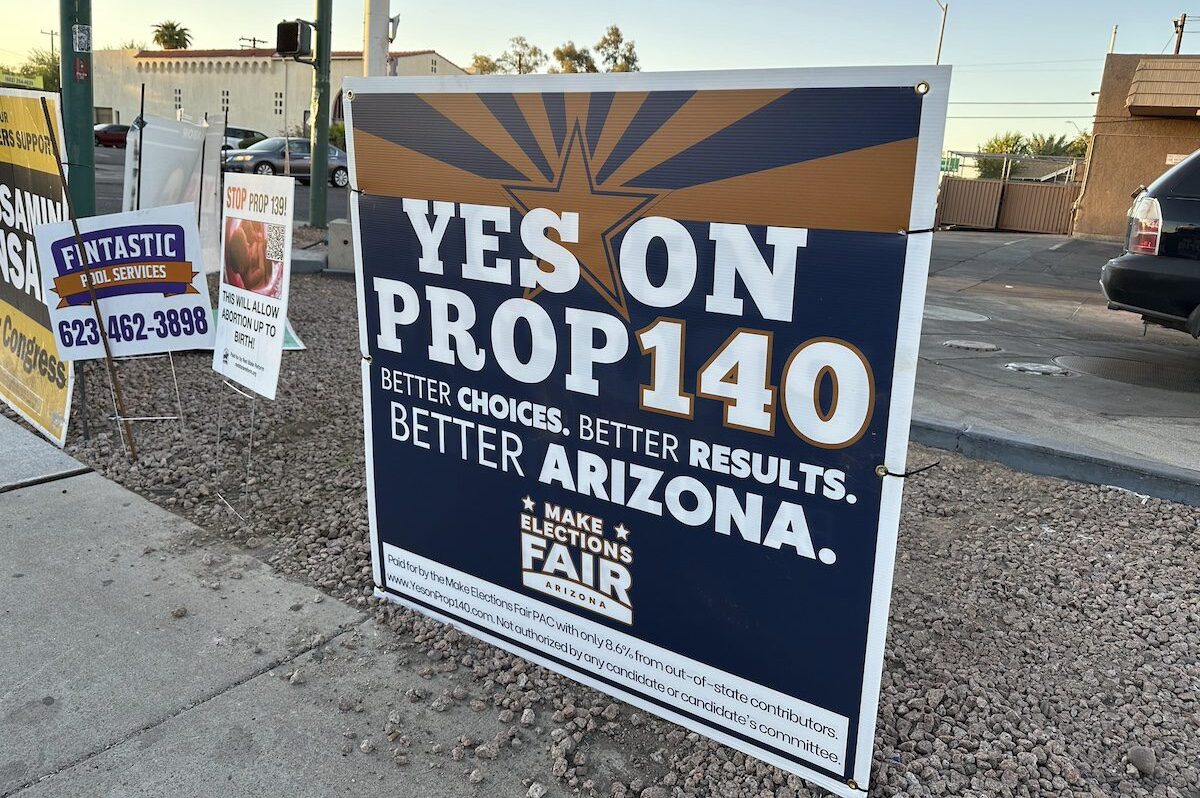
A yard sign is seen Thursday, Oct. 17, 2024, at a Phoenix intersection promoting Prop 140, which would establish an open primary system for Arizona elections. (AP Photo/Sejal Govindarao)
Voters in Arizona will see competing measures about primary elections on their November ballots. If voters approve them both, what happens next could be up to the courts to decide.
Like more than a dozen other states, Arizona has a constitution stating that if two or more conflicting ballot measures are approved at the same election, the measure receiving the most affirmative votes prevails.
That sounds simple. But it’s actually a bit more complicated.
That’s because the Arizona constitution applies the most-votes rule to the specifically conflicting provisions within each measure — opening the door to legal challenges in which a court must decide which provisions conflict and whether some parts of each measure can take effect.
The scenario may sound odd. But it’s not unheard of.
Conflicting ballot measures “arise frequently enough, and the highest-vote rule is applied frequently enough that it merits some consideration,” said Michael Gilbert, vice dean of the University of Virginia School of Law, who analyzed conflicting ballot measures as a graduate student two decades ago when his curiosity was peaked by competing measures in California.
What’s going on in Arizona?
Arizona, like most states, currently uses partisan primaries to choose candidates for the general election.
The Republican-led Legislature, on a party-line vote, placed an amendment on the November ballot (Proposition 133) that would enshrine partisan primaries in the state constitution, reaffirming that each party can advance a candidate for each office to the general election.
A citizen’s initiative (Proposition 140) seeks to change the current election method. It would create open primaries in which candidates of all parties appear on the same ballot, with multiple candidates advancing to the general election. It would be up to lawmakers or the secretary of state to enact requirements for exactly how many should advance. If at least three make it to a general election, then ranked choice voting would be used to determine the winner of the general election.
The Arizona Constitution says the winning ballot measure with the most votes shall prevail “in all particulars as to which there is conflict.”
In the past, the Arizona Supreme Court has cited that provision to merge parts of competing measures. For example, in 1992, voters approved two amendments dealing with the state mine inspector. One measure extended the term of office from two to four years. The other measure, which got more votes, limited the mine inspector to serving four, two-year terms.
In a case decided 10 years later, the Supreme Court said parts of both measures should take effect, ruling the mine inspector could serve four, four-year terms. That could have implications for Arizona’s future elections if voters approve both competing measures on this year’s ballot.
“The court really goes out of its way to harmonize the two,” said Joseph Kanefield, an attorney and former state election director who teaches election law at the University of Arizona. Striking one measure entirely “is something that the court will try to avoid unless they absolutely determine the two cannot exist together.”
Are you ready to vote? See what’s on your ballot and make a voting plan here.
READ MORE: Here’s every proposition on the Arizona ballot this year and what they’d do

Republican Rep. Juan Ciscomani wins reelection to Arizona US House seat
Juan Ciscomani won his first term in 2022 when he beat Kirsten Engel by over 5,200 votes. PHOENIX (AP) — Republican Rep. Juan Ciscomani won...

No, Elon Musk did not hack Arizona’s election results with Starlink
Only three Arizona counties use Musk's Starlink, and two of them voted for Kamala Harris. As President-elect Donald Trump begins filling key posts...

Why AP called the US Senate race in Arizona for Ruben Gallego
The AP only declares a winner—in this case, Ruben Gallego—once it can determine that a trailing candidate can’t close the gap and overtake the vote...

Women have led other democracies, but US voters rejected the 2 who tried—what will it take to elect a female president?
In the United States, 45 men have served as president, starting with George Washington in 1789. Donald Trump’s reelection extends that streak....




